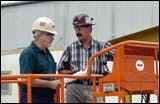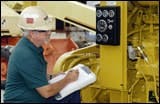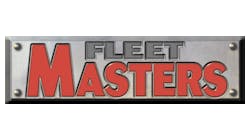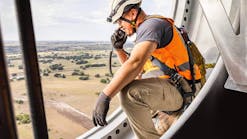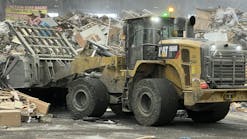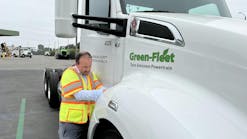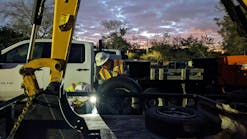The Traylor Bros. Equipment Division has several clear goals. The first is to equal or outperform national averages in all safety-industry measurements. Goals two and three — develop superior talent, and employ the industry's best equipment-management practices — work hand-in-hand to deliver goal one and goals four and five — be in the upper 25 percent of heavy-civil-industry profitability, and beat the budget on every project. The company's progress in developing people and managing equipment earned Thad Pirtle and the Traylor Equipment Division the 2006 Fleet Masters Award.
Equipment superintendents and field mechanics are certified in forklift operation, manlift inspection, crane inspection, welding, equipment electrical systems, and mobile hydraulics. They are also required to take two weeks of factory training annually. All will get formal communication and customer-service training.
Traylor Bros. Inc.
Headquarters: Evansville, Ind.
Specialty: Highway/heavy and marine constructor with expertise in boring tunnels, building bridges, dams and ports
Market Range: North America primarily, with some overseas work
Geographic Range: All U.S. coastlines, North America's inland waterways, Hawaii, Alaska, Mexico and Canada
Traylor Equipment Division
Fleet Value: $165 million
Fleet Makeup: 2,900 total units, including 92 cranes, 10 tug boats, 10 tunnel-boring machines, 45 underground locomotives, 40 loaders, 20 dozers, 34 forklifts, 28 pile hammers, 40 Class 7 and 8 trucks, 200 light trucks and cars
Facilities: One shop in Evansville, a riverfront maintenance facility in Wickliffe, Ky., and storage yard in Rialto, Calif.; four mechanics' trucks
Equipment-Support Staff: 45 total, including four field mechanics, four master mechanics, six field equipment superintendents, 14 project mechanics, three lube techs, 10 shop mechanics, and two corporate equipment superintendents
Tasks: Heavy/marine equipment rentals, heavy fabrication, equipment maintenance and rebuild including crane remanufacture, specialty-equipment fabrication including building tunnel-boring machines, equipment storage and staging, field support
Division Advantages:
- 80+ years management experience
- Extensive fleet at below-market rates
- Three well-located storage yards
- Deep-water port on Mississippi River
- Expertise in Traylor specialties
- Craning expertise
- Equipment-insurance expertise
- Heavy-fabrication capabilities
- Low-cost maintenance and repair
- Quality reputation
The division has promoted four field mechanics that travel to all Traylor projects and equipped them with service trucks. They are factory-trained on the brands the company operates, and certified for annual crane and manlift OSHA inspections. One of the mechanics is certified for crane-boom welding.
These four field mechanics assist projects at startup and shutdown, and provide an alternative to distributor support. They also supplement the projects' maintenance workforce during peak periods.
Traylor's commitment to improving peoples' equipment skills exceeds the boundaries of the equipment-division payroll. The company wants all of its project managers, engineers, superintendents, and division estimators to attend the weeklong training from the National Commission for the Certification of Crane Operators (NCCO) and take the written test. The practical test is optional. So far, 75 percent of them have been through the program.
The equipment division sponsored 26 Traylor senior managers to the 2005 Conexpo show for three days. The division also engages in corporate training throughout the organization, educating engineers, superintendents, project managers, and foremen.
Parts costs are tracked for each piece of equipment and monitored at the project level. They're expressed as a percentage of the project's equipment rental cost per month, which has helped focus attention on both parts and equipment usage. Better preventive maintenance, mostly completed by project personnel, and improved application of equipment has cut parts costs in half over the past 10 years.
Traylor also tracks machine availability by unit number and by equipment type. Equipment operators fill out equipment performance forms every day to track downtime. The company is halfway through a two-year pilot program with Qualcomm that has seen the installation of more than 100 GlobalTracs wireless tracking devices for monitoring the utilization and location of cranes, loaders, dozers, rollers, tug boats, trucks, forklifts and other equipment.
Utilization goals are set for each equipment class and actual use is tracked for each piece of equipment. Being able to compare an individual machine's usage to that of a whole group of like machines helps identify problem machines and improve overall equipment quality.
"We are currently operating at 97 percent machine availability on the machines we are tracking," says Pirtle. The company continues to add machine types to the reporting.
Pirtle measures quality of the Traylor equipment division's work and satisfaction of project superintendents with a single program called Traylor Equipment Quality. The program requires shop managers or equipment superintendents who ship a machine to sign their name on an Equipment Quality sticker fixed to it, and phone the project superintendent two weeks after delivery to be sure he's satisfied. Any deficiencies in the machine that might keep it from being 100-percent productive are recorded. The primary responsibility of the company's six field equipment superintendents is to visit each job in their territories monthly to make sure equipment is working as it should and that project people are satisfied.
Traylor Equipment Quality has been steadily improving fleet reliability and recording fewer deficiencies since early in 2004. Pirtle meets with his people quarterly to discuss progress, adapt the program, and administer the company's safety-incentive program.
"The goal is zero deficiencies," declares Pirtle. "The equipment business is becoming increasingly competitive. The success of our division rests upon our reputation to provide quality equipment that is on schedule and reliable in an environment where the safety and well-being of our people is paramount."
Thad Pirtle (right) and Roscoe Beall, manager of Traylor's Evansville shop, check a manlift's fall-protection tieoffs. The Traylor Equipment Division's first priority is the safety of people using and servicing company equipment.
